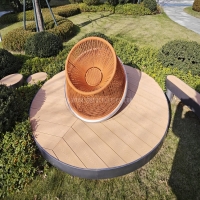Welcome to the website for landscape facilities products and knowledge.
How does wrought iron resist chemical corrosion?
Wrought iron is renowned for its durability and resistance to chemical corrosion, making it a preferred material for outdoor and industrial applications. The secret lies in its unique composition and natural protective mechanisms.
Firstly, wrought iron contains a high percentage of pure iron, which forms a stable iron oxide layer (Fe2O3) when exposed to oxygen. This layer, commonly known as rust, acts as a barrier, preventing further chemical reactions with corrosive elements like water, acids, or salts. Unlike ordinary iron, the dense oxide layer on wrought iron adheres tightly, slowing down degradation.
Additionally, wrought iron often undergoes treatments such as galvanization or powder coating. These methods apply an extra protective layer, shielding the metal from harsh chemicals and environmental factors. For instance, galvanized wrought iron is coated with zinc, which sacrificially corrodes before the iron, extending its lifespan.
Lastly, the fibrous slag inclusions in wrought iron’s microstructure contribute to its resilience. These impurities create a natural buffer against corrosive agents, reducing the likelihood of deep penetration.
In summary, wrought iron resists chemical corrosion through its inherent iron oxide layer, protective coatings, and unique microstructure, ensuring long-term strength and aesthetic appeal.
Related search:

Recommendation
Swivel chair-Specialty steel structure woven rattan leisure chair with rotatable design